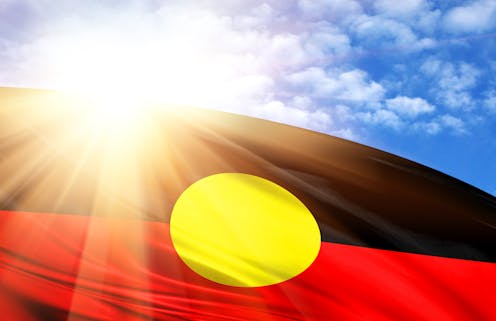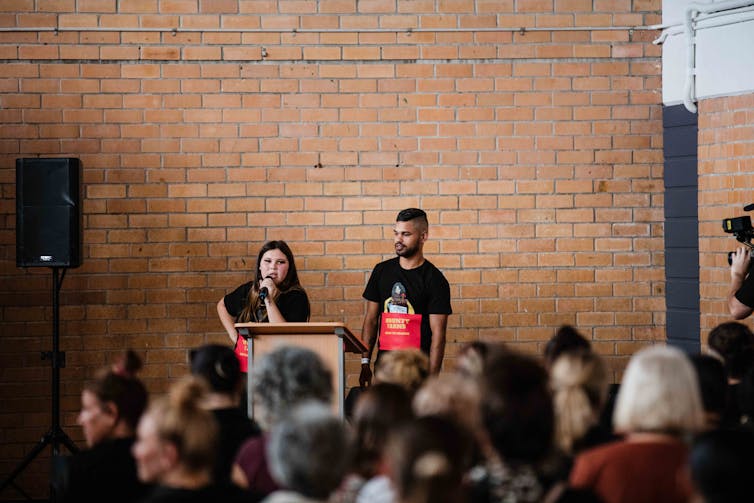Source: The Conversation (Au and NZ) – By Fiona Allison, Research Fellow, Jumbunna Institute of Indigenous Education and Research, University of Technology Sydney

Shutterstock
Justice reinvestment emerged in the United States more than 20 years ago as a way to reduce mass incarceration and its vast costs by addressing the social drivers of imprisonment.
Through justice reinvestment, communities identify and develop responses to issues that feed high rates of re-incarceration locally, resourced through a “reinvestment” of funds drawn from prison budgets. The focus is often on better access for ex-prisoners to essentials such as accommodation and reducing inequity at a community level in health, education and other outcomes.
The Albanese government is currently implementing its 2022 commitment to A$81 million in funding to support justice reinvestment initiatives in Aboriginal and Torres Strait Islander communities.
The New South Wales government also recently pledged $9.8 million for Aboriginal-led justice reinvestment initiatives in Kempsey and Nowra.
But what does “reinvestment” mean in practice? Who decides what gets funded and how?
To find out more, we spoke with Aboriginal communities in the NSW towns of Bourke, Moree and Mount Druitt.
Our report, produced alongside these Aboriginal communities, aims to convey their understanding of justice reinvestment.
This work invites government to co-design with community what “reinvestment” means, led by those Aboriginal communities where local solutions are already underway.
Investing in Aboriginal-led solutions
We heard that current criminal justice approaches are not working in Aboriginal communities like Moree and Mt Druitt. Far too many Aboriginal people are taken off-country to be locked up away from family, employment and schooling.
This fractures community and cultural connections and other elements of a healthy, thriving Aboriginal community. The scale at which this occurs does more harm than good and drives re-incarceration. As one Moree community member told us:
They just come out worse. It’s like setting them up to fail. Like, it doesn’t fix it at all. Do you know anyone that’s gone to jail and come out and been good, like better?
Aboriginal people in Moree and Mount Druitt know what’s needed to turn this around. One Moree community member said:
As we’ve been saying for years, we’re the only ones that can tell people what’s wrong, what’s the best way to fix it. And we’re the only ones that can actually do it.
These communities have developed Aboriginal-led justice reinvestment governance structures and programs that strengthen culture and self-determination. They aim to improve life opportunities to keep more Aboriginal people – particularly young people – out of custody.
In Mount Druitt, justice reinvestment includes Mounty Yarns, a project led by local young people with both lived experience of incarceration and ideas about how to reduce contact with the justice system that they want heard:
We don’t want the next generation to go through what we went through. We want to be a voice so others don’t have to keep repeating their stories.

Aboriginal communities like Moree and Mount Druitt need increased access to resources and decision-making to implement their solutions.
They are calling for backing to put their ideas in motion, including partnerships, programs and interventions they identify as crucial to preventing offending.
These ideas, once implemented, may work well quickly, take time to succeed or perhaps struggle. Increasing community agency is a crucial outcome in itself, regardless.
Funding justice reinvestment
Diverting funding from prisons to resource justice reinvestment in communities like Moree or Mount Druitt is appealing to Aboriginal people. They want divestment from what they see as highly punitive institutions that have long caused significant harm.
One idea for a source of funding might be a state-level mechanism requiring the NSW government to deposit an annual levy into a justice reinvestment fund.
Funds could potentially be drawn from justice spending allocations, calculated on the basis of the number of Aboriginal people imprisoned in NSW in the year in question.
Aboriginal people would determine where this money is spent, with priority given to justice reinvestment and other Aboriginal community-led and prevention-focused approaches likely to reduce over-representation.
As this is achieved, the levy will reduce, as will justice and related costs for government.
Importantly, the enormous social and economic costs for Aboriginal people of mass incarceration would also be averted. As one Mount Druitt community member told us:
What’s the outcome of prison spending? A criminal record. There’s lots of things they can do before they chuck them into jail but that’s the first option out here. Help him reconnect with his family, his culture. You could do a lot of things with that money.
Aboriginal people in Mount Druitt and Moree told us of other ways to “invest” in community-led ideas for change.
They want funding decisions to be informed by community knowledge of which services and programs will best contribute to outcomes likely to help keep Aboriginal people out of prison.
One Mount Druitt community member told us:
We’ve got no control here in Western Sydney. We need to have more of a say when we’re getting in funding here. How is that funding going to be distributed?
They have also identified “tipping points” that push Aboriginal people into the justice system. These include inappropriate or biased police decisions about bail, inadequate post-release support and school exclusions for younger people. They are calling for government reform in these areas.
Achieving change
The message from our report is clear: Aboriginal communities want to determine their own priorities for change and to lead that change. This is crucial to reducing Aboriginal over-representation.
Commitment by governments to funding justice reinvestment initiatives is definitely a positive step in the right direction.
Alongside funding, reform to government ways of working and policy will also be essential to ensuring justice reinvestment has the best chance of success.
Read more:
Australian governments should follow the ACT’s lead in building communities, not prisons
![]()
Fiona Allison completed research on reinvestment as a consultant for Just Reinvest NSW. As an academic at Jumbunna, she is also involved in the co-design process informing implementation of the federal government commitment to justice reinvestment.
Daniel Daylight works for JustReinvest NSW.
Thomas Duncan works for JustReinvest NSW.
– ref. ‘Too much money is spent on jails and policing’: what Aboriginal communities told us about funding justice reinvestment to keep people out of prison – https://theconversation.com/too-much-money-is-spent-on-jails-and-policing-what-aboriginal-communities-told-us-about-funding-justice-reinvestment-to-keep-people-out-of-prison-200531






